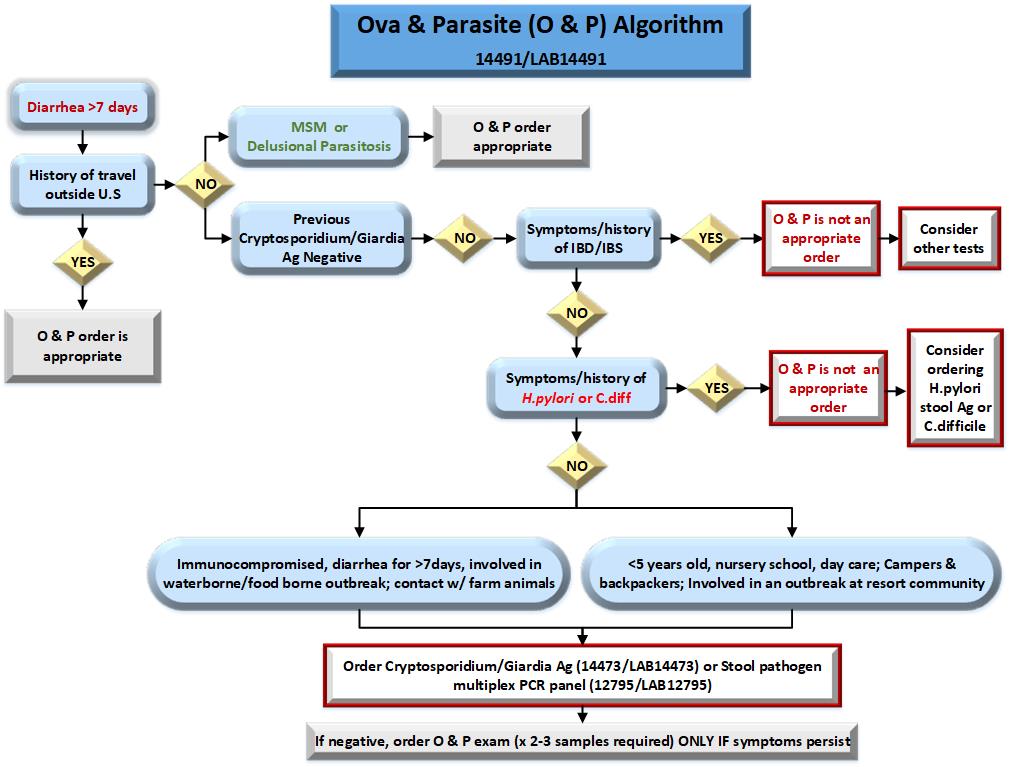
Ova & parasites examination, feces or sputum-14491
Test info
O & P
O&P
Ova + parasite exam
ova and parasites
Establish the diagnosis of parasitic infestation.
Ova and Parasite testing is appropriate for patients that have had diarrhea for at least 7 days, and a recent negative Cryptosporidium/Giardia antigen test. If diarrhea less than 7 days and do not have a recent negative test order the Cryptosporidium/Giardia antigen test (14473)
This will not detect Cryptosporidium, Cyclospora cayetanensis, or Microsporidium.
One negative result does not rule out the possibility of parasitic infestation, in patients who shed organisms cyclically and in chronic infections. Giardia and Cryptosporidium are the most prevalent GI parasitic infections in US, and the sensitivity of microscopic methods for the detection of Giardia is from 46% to 80% and Cryptosporidium is <5%. Tests for Giardia and Cryptosporidium antigens have higher sensitivity and specificity.
Specimen
Clean container
Fecal specimens for parasitic examination should be collected before initiation of antidiarrheal therapy or anti-parasitic therapy.
Recommended: For patients suspected of potential parasitic diarrhea, three (3) stool specimens collected on different days (within a 7 day period) should be submitted.
- Collect sample in a clean container
- Place stool into each vial (pink and grey) up to, but not higher than, the red fill line within one (1) hour of collection
- Do not overfill the containers as they will be rejected if overfilled
- Both vials must be collected the same day
- Mix well
If paragonimiasis or echinococcosis is suspected, submit specimen in 10% formalin.
Sputum:
- Collect sputum sample in a sterile cup
- Within one (1) hour of collection, transfer sputum to the pink vial only of the Para-Pak® Zn PVA and formalin fixative (pink and grey) up to, but not higher than, the red fill line
Ambient (strict) - 6 months
Refrigerated - NO
Frozen - NO
- Specimens sent on diapers or tissue paper
- Only one (pink or grey) vial received for stool specimen (QNS)
- If both vials are not collected the same day
- Grossly leaking specimens may not be processed
- Specimen containing interfering substances (eg, castor oil, bismuth, Metamucil®, barium)
- Specimens delayed in transit will not have optimal yield
- Specimens contaminated with urine will not have optimal yield
- Unlabeled specimen or name discrepancy
- Expired transport device
- Specimen not received in O & P preservative transport containers with formalin and PVA
Performance
Formalin concentrate and trichome stain with microscopic examination
Clinical and Interpretive info
No parasites seen
If Schistosoma haematobium infection is suspected, submit a urine specimen for Ova and parasites examination, urine
Billing
87209



